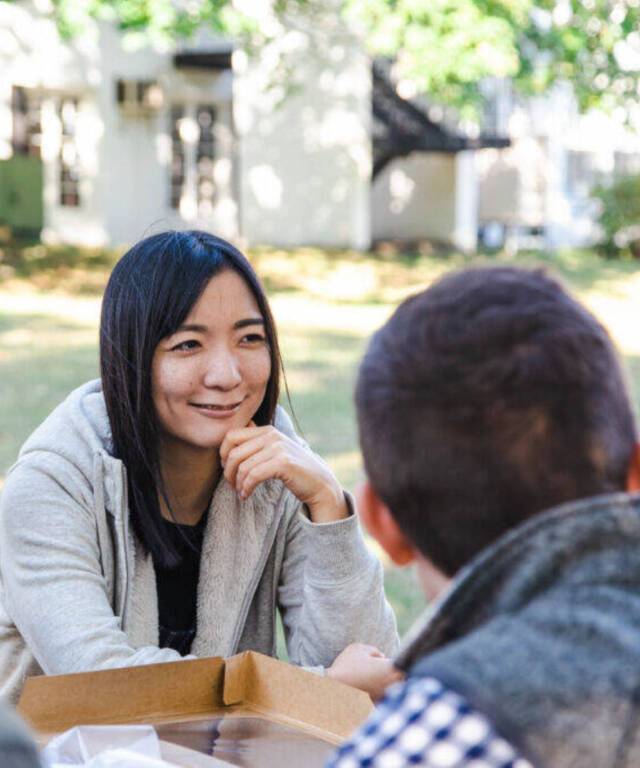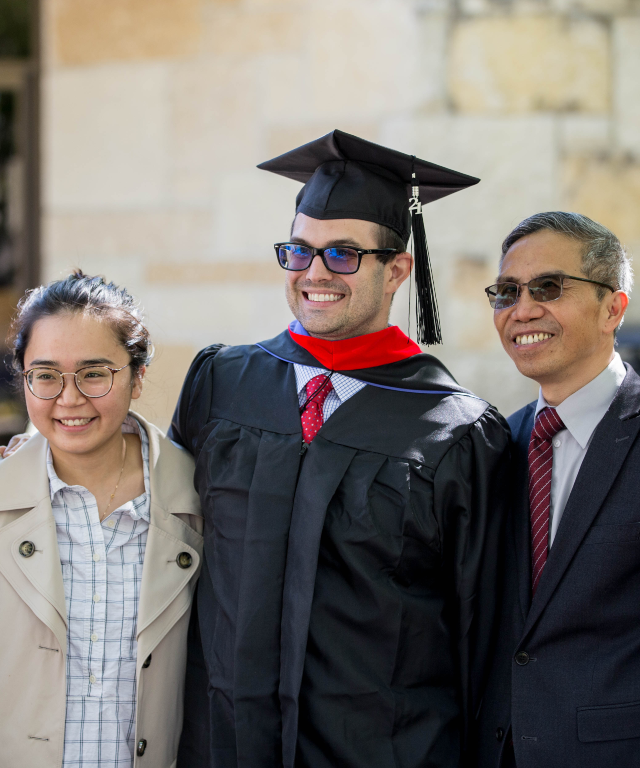Doctor of Philosophy
Educational Studies
CREDITS
60 hours
60 hours
FORMAT
On Campus | Hybrid
On Campus | Hybrid
The Doctor of Philosophy program in Educational Studies incorporates particular concept areas to expand your professional capacities in research and educational leadership. You will be challenged to integrate faith and learning at every step of the program as you engage these areas in a variety of experiences and academic seminars.
Many PhD/EDS participants are involved in the program during sabbatical or other educational leaves from their place of service. Admission requirements assume that you have completed one or more graduate degrees and have recent experience in an educational ministry. Usually you would not be in a major career transition when you decide to enroll in this program.
Program design
The PhD/EDS is designed to be a 4-5 year program (60 semester hours). Full-time participants may complete seminar work in two years followed by a year of comprehensive exam and proposal preparation and a year of dissertation research. The recommended full-time enrollment is 9 semester hours each term. The program operates on a year-round basis, with full-load enrollment available in each of two semesters and normally, summer. Completion of 18 hours constitutes one academic year. Program seminars are offered in two-week modular, week-long modular and weekend formats.
Program Values
The international EDS learning community practices a fundamental commitment to and reliance on God’s truth as revealed in the Bible and Jesus Christ, God’s redemptive purposes in Christ, and the sustaining work of the Holy Spirit. The EDS community seeks to act on the reality that all persons are created in God’s image. Participants engage one another professionally, academically, and personally. They share resources and ideas and consult one another concerning specific issues and situations related to their ministry. The program style is collaborative rather than competitive, and mutual respect for colleagues and the diversity of perspectives is evident.
Learning is seen as lifelong, formal and nonformal in context, linear and narrative in approach, and participatory. The interdependence of theory and practice, the processes of dialogue and disciplined inquiry, and the integration of theology and the social sciences are viewed as normative. Faculty are committed to the effective progress and completion of the participants and, through the experiences of the program, seek to foster the cultivation of sustainable habits in thought, spirit, relationships, and service.
Why TEDS?
Trinity has been entrusted with the Gospel since 1897, and every day we are called to live with purpose. Our purpose as a divinity school is to know the Gospel, live the Gospel and make the Gospel known. In today’s ever-changing culture, Trinity immerses students in a community of biblical orthodoxy and practical living. The Trinity faculty is among the most widely published in evangelical academia and has deeply influenced the leaders shaping the present and future of evangelical Christianity across the globe.
Core Competencies
Three foundational areas of professional competency provide the academic focus of the program: developing a research mindset and skill base; thinking as an educational leader; and theologically reflecting about educational issues against a broadly cultural and missiological framework. The intentional linkages between the PhD (Educational Studies) and the PhD (Intercultural Studies) provide opportunity to relate principles from theology and the social sciences to education, mission, and leadership.
The Learning Culture
The appropriate outcome of doctoral education is seen to be the development of refined, sustainable habits of scholarship and professional leadership. Participants are expected to enter fully into the community of scholarship: giving and receiving ideas, information, sources and materials; entering fully into seminar discussions; and participating constructively in open hearings—their own and their colleagues’ oral comprehensive examination, presentation of the research proposal, and dissertation defense.
Written work at the doctoral level has moved well beyond typical term paper preparation. Participants are expected to read and research with a view to making a contribution to the literature of the field and to ongoing discourse— with doctoral colleagues and other academic professionals. Much that is written in the program should be considered as potentially publishable. Participants are expected to use the network of seminary and university libraries in the Chicago area and to engage the members of this international community in discussion about research and writing projects. In this way, the program provides opportunities for participants to broaden their perspectives beyond their own traditions and cultures.
The dissertation research design that undergirds the PhD/EDS program presumes that a substantial base of descriptive research is necessary to generate hypotheses that will ultimately be explored through experimental studies. It is our perspective that experimental research conducted without a substantial base in description and inquiry is impoverished. Participants in the TEDS PhD/EDS program generate a substantial body of dissertations, most of which have been descriptive or theological/historical in format. We will continue to encourage descriptive research as the primary mode of inquiry, but with appropriate guidance experimental studies could be built on these emerging categories of research findings.
The preferred learning environment is one that fosters a community in which all participants, students and faculty alike, are engaged in further development. It is also inherent in the program’s philosophy of cooperative learning that healthy interpersonal relationships enhance the academic endeavor. Therefore, faculty and participants, along with family and friends, are invited to take advantage of scheduled and spontaneous opportunities for social fellowship.
Financial Aid
Did you know that nearly 95% of our students receive some form of financial aid? At Trinity we offer scholarships, grants, rebates, and other aid options to help pay for the cost of schooling. Learn more about what is available below or by contacting the Financial Aid Office at [email protected].
Prerequisites
Applicants for the PhD (EDS) program are required to:
- Have earned an appropriate master’s degree (at least 36 semester hours).
- Submit an electronic sample of published writing or a recent academic research paper if nothing has been published.
- Have completed at least four years of vocational experience in ministry with evidence of relevant gifts and abilities.
- Have earned a cumulative GPA of at least 3.5 (on a 4.0 scale) in previous graduate studies.
- Provide recommendations from a Ministry Supervisor, Professor from recent graduate studies, Professional Colleague, Lay person from church.


Curriculum
- Foundations
- Focus
- Research
Foundations in Education: 18 hours
- Psychological and Sociological Foundations of Education
- Biblical and Theological Formation of the Educator
- Historical and Philosophical Foundations of Education
Primary Elective Focus Areas: 18-24 hours
- Educational Ministry in the Local Church
- Teaching and Learning
- Leadership and Organizational Development
- Contemporary Issues
Research in Education: 9 hours
- Foundations in Social Science Literature
- Social Science Research Design
- Qualitative Research Methods
International Applicants
All international PhD/EDS program students, including students from Canada, are now required to enter the United States with an F-1 visa. PhD/EDS residential students (i.e., living in Deerfield and registered for full-time attendance) must comply with the same visa requirements as residential master’s-level applicants (see Admissions section).
PhD/EDS nonresidential students (i.e., commuting to the Deerfield Campus for each modular class) must also obtain an F-1 visa. This requirement represents a major change to immigration policy in the United States. Students who enter the United States to pursue the PhD/EDS degree without the F-1 visa potentially jeopardize their ability to complete the degree and reenter the United States. F-1 visas will remain valid as long as reentry into the United States for the purposes of study occurs at least once every five months. A new visa will be required if reentry does not occur within this time period.
In order for a Certificate of Eligibility (I-20) to be issued for PhD/EDS nonresidential students, the following conditions must be met:
- Applicants whose first language of instruction is not English must demonstrate English Language competency as measured by a qualifying score on the TOEFL.
- Applicants must be admitted to the PhD/EDS program as a nonresidential student.
Request Information
Combining unrivaled academic rigor with a wholehearted commitment to gospel fidelity and an abundance of flexible options, TEDS offers a theological education that equips you to serve Christ with wisdom and grace, in truth and love.
